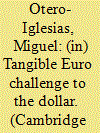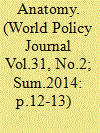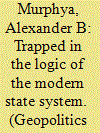| Srl | Item |
| 1 |
ID:
111595


|
|
|
|
|
| Publication |
2012.
|
| Summary/Abstract |
The main purpose of this article is to shift the dollar vs Euro debate away from US-EU centrism to perspectives from emerging markets. Drawing on 40 semistructured financial elite interviews in Brazil and China, the key research question studied here is whether the US dollar is malfunctioning as the leading international currency in these parts of the world, and, if so, whether the Euro can be an alternative to the greenback. The results show that the status of the dollar as the main anchor in the monetary system is seriously questioned among financial elites in China and Brazil. As yet, though, the Euro does not represent an alternative to the dollar because of its fiscal and political fragmentations. However, despite these institutional shortcomings, the European currency is seen as an ideational role model for super-sovereign monetary integration out of dollar unipolarity based on consensual negotiations not only on a regional, but also on a global scale.
|
|
|
|
|
|
|
|
|
|
|
|
|
|
|
|
| 2 |
ID:
133456


|
|
|
|
|
| Publication |
2014.
|
| Summary/Abstract |
Alternative currency is a privately developed form of money that is used as a substitute to national currency in designated areas. It is not regulated by national governments or banks. A familiar example is the e-currency, Bitcoin. However, Bitcoin is neither the only nor the oldest example of alternative money. The chiemgauer, Brixton pound, sardex, and the dam are examples of alternative money currently in use in Germany, England, Italy, and the Netherlands, respectively. The goal with these currencies is to promote the idea of spending locally. By keeping the currency within the designated area, the local economy is able to prosper regardless of the state of the national economy. This enables communities to establish local markets that are less affected by national trends
|
|
|
|
|
|
|
|
|
|
|
|
|
|
|
|
| 3 |
ID:
128841


|
|
|
|
|
| Publication |
2014.
|
| Summary/Abstract |
Germany's highest court stopped short of ruling the European Central Bank's programme to support the euro illegal. Now the European Court of Justice must find a way to make the programme acceptable without making it ineffective.
|
|
|
|
|
|
|
|
|
|
|
|
|
|
|
|
| 4 |
ID:
083058


|
|
|
|
|
| Publication |
2008.
|
| Summary/Abstract |
Will the dollar soon lose its key international currency status? In this article I argue that neither the emergence of the Euro nor geopolitical issues threaten the future of the dollar. The world's central banks may slow down their accumulation of dollars, but are unlikely to put an end to the dollar standard regime. I also caution against confusing the international role of the dollar as the supreme store of value with its two other roles-as the dominant international unit of account and medium of exchange. These latter two functions do not change abruptly, meaning, once again, that there is no immediate threat to the future of the dollar. The article also discusses similarities between today's dollar standard and the Bretton Woods regime, and conclude that the complexity of today's system is such that it cannot just be defined as a repetition of the Bretton Woods system, or 'Bretton Woods 2'.
|
|
|
|
|
|
|
|
|
|
|
|
|
|
|
|
| 5 |
ID:
123324


|
|
|
|
|
| Publication |
2013.
|
| Summary/Abstract |
In the wake of the Single European Act of the mid-1980s and a series of follow-on initiatives aimed at fostering greater integration in Europe, a number of commentators began describing Europe as a truly novel political-territorial arrangement. By the middle of the 1990s, however, the adoption of a common currency came to dominate the European integration agenda. The embrace of monetary union reflected a view of European integration that was firmly embedded in the logic of the modern territorial state system. That logic led many commentators to view the success or failure of integration in terms of the degree to which powers were being transferred from state governmental and economic institutions to the central decision-making bodies of the European Union. Such an approach cast the EU as a super-state rather than as a new type of political-institutional entity. As a result, the integration project was less subversive of the state system than it might otherwise have been - bolstering the view of the European Union as a distant bureaucracy not adequately attuned to the needs of everyday Europeans and fueling nationalist sentiments: a social force with deep roots in the modernist territorial order. Moving the European integration process forward will likely require embracing conceptions of progress that are less tethered to modernist territorial ideas and assumptions.
|
|
|
|
|
|
|
|
|
|
|
|
|
|
|
|